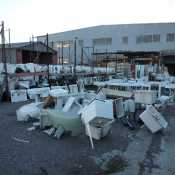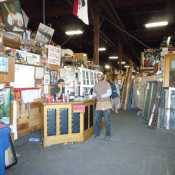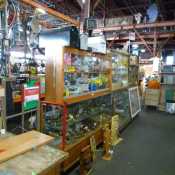Key Facts:
Project summary: A for-profit business with the mission “to end the age of waste”, selling a wide range of salvaged goods (from building materials through to clothing and electronics) to the general public.
Location: Berkeley, California, USA
Programme: General store; Building Materials Exchange, Collection service
Initiator: Three partners including Dr. Daniel Knapp, current President
Project Duration: On-going (opened on current site in 1999, spent previous year on a temporary site)
Lead in Time:
Set up 1980; moved site twice in 1981 and 1983; 1982 City of Berkeley incubates Urban Ore and offers them a rent free site until they brought in more than £7,000; 1989 it voluntarily vacated the City property to let another green business expand; Urban Ore found its current location in 1999 and moved the Building Materials and the Salvaging and Recycling departments in 2000; in May 2009 Urban Ore was able to purchase its current property with assistance.
Site Area: 3-acre facility
Client Team: Founder Dan Knapp and Board members Mary Lou Van Deventer and Michael Casady
Funding Sources:
Now entirely self-reliant through sales. At one of its earliest sites, the City of Berkeley didn’t charge rent until they exceeded an income threshold of £7k (c. £20k in 2012 terms), after which rent was charged as a percentage of income over that amount. From current sales 15% of income isfrom recylced doors and 10% is from windows.
Project Costs (Build): The most recent large build out required about £650,000 in contracts and materials, including innovative uses of recycled materials.
Profitability/Loss: c. £1.7mil annual turnover
Local Links: Use of local architects and tradespeople
Publicity/advertising: Website, Twitter, Facebook, eBay
Project Evaluation:
Site Details & Ownership:
Site located in West Berkeley on Murray Street and 9th Avenue near Highway 80. Site is accessible by vehicles, bikes, public bus and pedestrians. Both land and building owned by Urban Ore.
Project Reach / Visitors / Target Audience:
Urban Ore has two operational faces. They are a disposal service so people can let go of unwanted but still-useful goods without wasting them, and a retail store where other people can find things they want at a low price. They serve the San Francisco Bay Area – or as far as customers are willing to drive, which is sometimes a hundred miles or even more. They are also consultants who design Zero Waste resource-recovery facilities both domestically and abroad. Urban Ore sells about 7,000 tons of reused and recycled goods per year, sending only 120 tons (c. 2% of inventory) to landfill each year. People in the community bring in about 75% of the merchandise; the other 25% of merchandise is collected by the Outside Trader Department, which makes pickups in response to calls. Urban Ore operates a drop-off/buyback facility with two specialized receiving areas for BMX and the General Store.
Problems Encountered / Overcome:
In its early years, Urban Ore’s founders had to contend with considerable political opposition, including those who advocated for landfill or for waste-to-heat incinerators instead of recycling facilities. They have also had to relocate sites six times since their foundation. In their own assessment: “Moving early, often, and sometimes in forced circumstances has influenced Urban Ore’s development in three major ways:
- Much of Urban Ore’s equipment and trade fixtures are portable. The company can modify its site plan and layout in response to changing conditions.
- Staff viewed each move as a chance to create a better, more effective layout by correcting mistakes and finding better ways to serve both supply and demand customers.
- With the outright purchase of the largest piece of the current site in May 2009, the company is confident that it will not have to move again anytime soon. But staff are still engaged in site modifications to handle more incoming materials more efficiently.”
What next?:
Urban Ore is also interested in helping people develop salvaging and scavenging as an essential part of any Zero Waste operation on any scale anywhere in the world, and offer consultancy at competitive rates. They have completed over two dozen Zero Waste resource recovery park designs around the world. The average cost for a schematic runs at about £9,500.
Complementary Programmes:
Throughout its history, Urban Ore has been active in the politics of recycling by participating in countless activist and advocacy actions. They have helped write several influential pieces of legislation that have become law through policymaker and voter approval.
Project Website/Further Info: http://urbanore.com


